Paquette Conveys Her Love of Science, Dance to Franklin STEAM Students Via Musical Magnetism
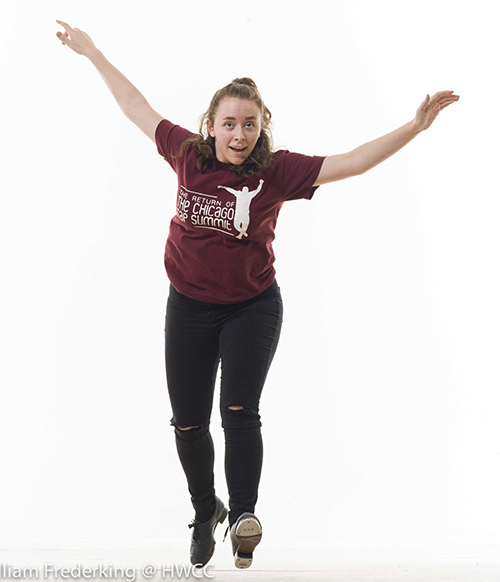
Carmen Paquette tap dancing. (Image courtesy of William Frederking.)
"As a kid, I found science fascinating; it felt like a good mystery book, and the more I learned, the more I understood about the world, as well as myself.” – Carmen Paquette
“I have always loved to dance. My parents constantly had music playing in the house growing up, and they often tell me that I came into the world dancing.” – Carmen Paquette
March 9, 2021
Carmen Paquette loves science. (Her dad, a material scientist, used to quiz her on the names and atomic numbers of the elements.) Carmen Paquette also loves tap dancing. (Her parents claim she came into the world dancing.) And she’s particularly passionate about expressing science via the arts—specifically, tap dance. So, when I-MRSEC planners decided that their spring 2021 edition of the Musical Magnetism curriculum at Franklin STEAM Academy would emphasize using the arts to convey science ideas, it makes sense that they would invite the summer 2019 I-MRSEC REU participant back to be involved. So, on February 18th, the materials scientist/professional tap dancer shared how she combines her two passions—science and dance—using dance to illustrate scientific concepts.
Poised to begin her career in Materials Science as a consultant with the Accenture company the week following her presentation at Musical Magnetism, Paquette shares why she took time out to participate in the program:
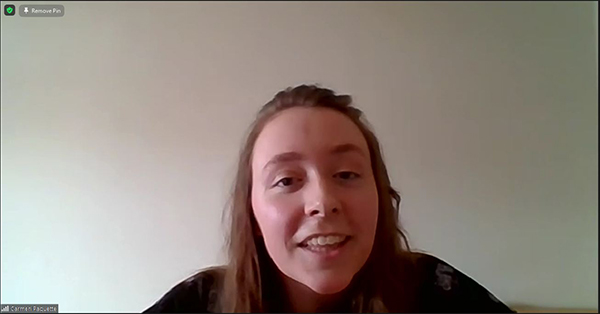
Carmen Paquette shares with Franklin middle schoolers during I-MRSEC's Musical Magnetism program.
“I believe in it!” she declares. “I am so happy that programs like Musical Magnetism exist, and I will support them in any way that I can. In this case, Pam (Pamela Martin, Outreach Coordinator at I-MRSEC) reached out to me, looking for people interested in providing students with a real-world example of what it might look like to "pursue STEAM" in some combination or another, and I was very excited to contribute.”
Paquette’s session with Franklin seventh and eighth graders began with an introduction to some highlights of her exploration of science, such as her participation in NASA's Community Aerospace Scholar (NCAS) program, an in-person workshop at Wallops Island, and that she was then invited to return to help facilitate the NCAS program the following year.
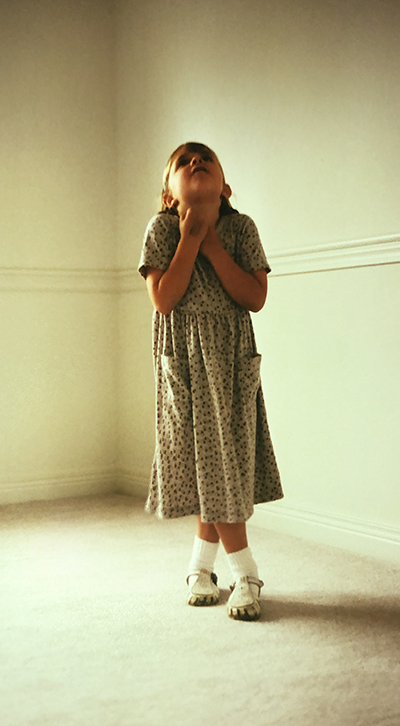
Carmen Paquette dancing as a little girl (Image courtesy of Carmen Paquette.)
She also shared highlights of her dance career. For instance, she took studio dance lessons throughout her elementary and high school years, even teaching her sister dances she had choreographed—which they then performed for their parents. More recently, she co-founded a dance company, "Broads on Boards,” which performs throughout the city.
However, Paquette is particularly passionate about somehow synthesizing two seemingly disparate things—art and science—by using the medium of art, particularly tap dance, to illustrate science. So she apprised students and showed them some clips of a dance she’d created, "Momentary Magnetism" which does just that. Paquette terms it “a communication of physics concepts through the unconventional medium of tap dance.” In fact, she had gotten the idea for the dance during another I-MRSEC outreach, a summer research experience she was involved with in 2019: I-MRSEC’s REU (Research Experience for Undergraduates). After learning about magnetism while researching the synthesis of antiferromagnetic materials, she created a dance about it. Following is her description of the thought processes she went through while choreographing it. “I took the entire process, from the heat gradient being the music and then the magnetic moments being the rhythm…and I took it all and translated it into a piece.”
After explaining to Franklin middle schoolers how she’d used body movement to exemplify the motion of atoms, she then shared with them a video clip of the dance she’d created. In the closing moments of her presentation, she answered students’ questions about both her career path and dance.
In addition to giving her the idea for the Momentary Magnetism dance, her I-MRSEC summer research experience also changed her paradigm regarding the compartmentalization most folks do vis-à-vis their vocation vs. their avocations. She discovered that there’s a new acronym in town, STEAM, which describes the incorporation of the ARTs into STEM (Science, Technology, Engineering, & Mathematics), which could pave the way for her to incorporate an amalgam of tap and science into her future. Upon experiencing this epiphany during the REU, she had told herself, “I want to combine the science and the art aspects of what I do, and I think it would be really cool.” Since then, she’s emphasized STEAM in many of her outreach activities.

Image of Carmen Paquette street performing with her Broads on Boards dance company. (Image courtesy of Carmen Paquette.)
Not surprisingly, her parents had actually inculcated into her the building blocks for embracing STEAM as a child. For one, her mom is a teacher.
“Because of her encouraging influence, my little sister and I have been engaging in creative activities since I can remember,” says Paquette. She recalls that her dad built them a puppet theatre when she was maybe 4 years old.
“We went through the entire process of building it together. Sadly, I was not allowed to use the power tools,” she complains. “But once it was built, the entire family painted it, made puppets from socks and yarn, and put on shows for my sister's dolls. We created stories for our toys, built cardboard houses, and spent hours in the backyard playing imaginary games.”
And of course, she also took after her dad, the material scientist, with his pocket periodic table, which he would use to quiz her and her sister on the names and atomic numbers of the elements.
“It practically goes without saying that thanks to my parents, I've always been able to view these two traditionally conflicting concepts (science and dance) as cohesive and complementary aspects of my life," she concedes.
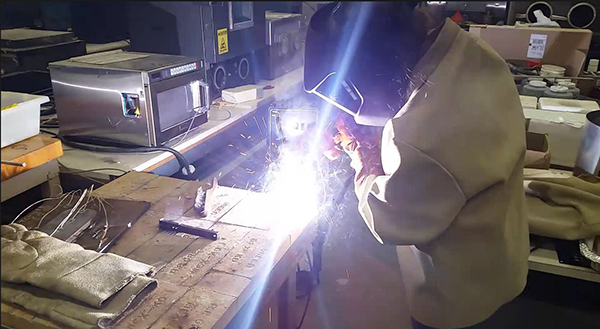
Carmen Paquette shares a slide with Franklin students during which she's learning how to weld.
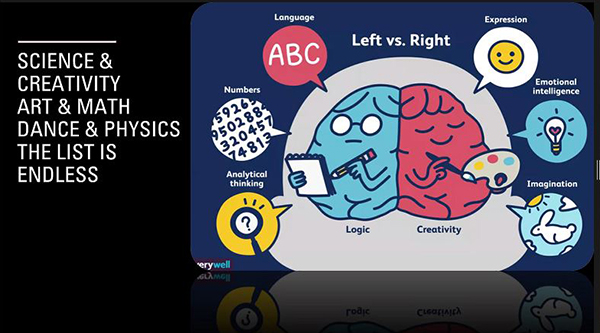
A slide Paquette shared with Franklin students about how the two sides of the brain are used when doing science and art.
And now, via outreach efforts like Musical Magnetism, she hopes to share with young people some of what she experienced as a child—especially her ideology concerning incorporating science and the arts. “I hope to blur the lines of what traditional science and artistic practices look like—so much so that crossover is normal and encouraged,” ” she acknowledges. Plus, concerning her work with young people, she also hopes to instill confidence—regarding both science and art—“in order to reduce the use of phrases and thoughts such as, "I can't do math." or "I'm not artistic." These thoughts limit what is possible for us as individuals, and as a collective.”
According to Paquette, her notion behind exposing young kids to STEM and STEAM is this: “Exposing anyone to the sciences, technology, engineering, art, and math is exposing them to the way we, as a society, have come to think about and understand the world. This exposure allows for the development of educated opinions based in fact. It is imperative that people of all ages are exposed to these building blocks of thought and understanding, but especially young children.”
In fact, Paquette's plans for the immediate future definitely include STEAM outreach. For example, of her stint as a consultant with the tech company Accenture, she says, “I expect this opportunity to enhance my STEAM skillset.” She also plans to continue to support the tap dance community in Chicago and worldwide.
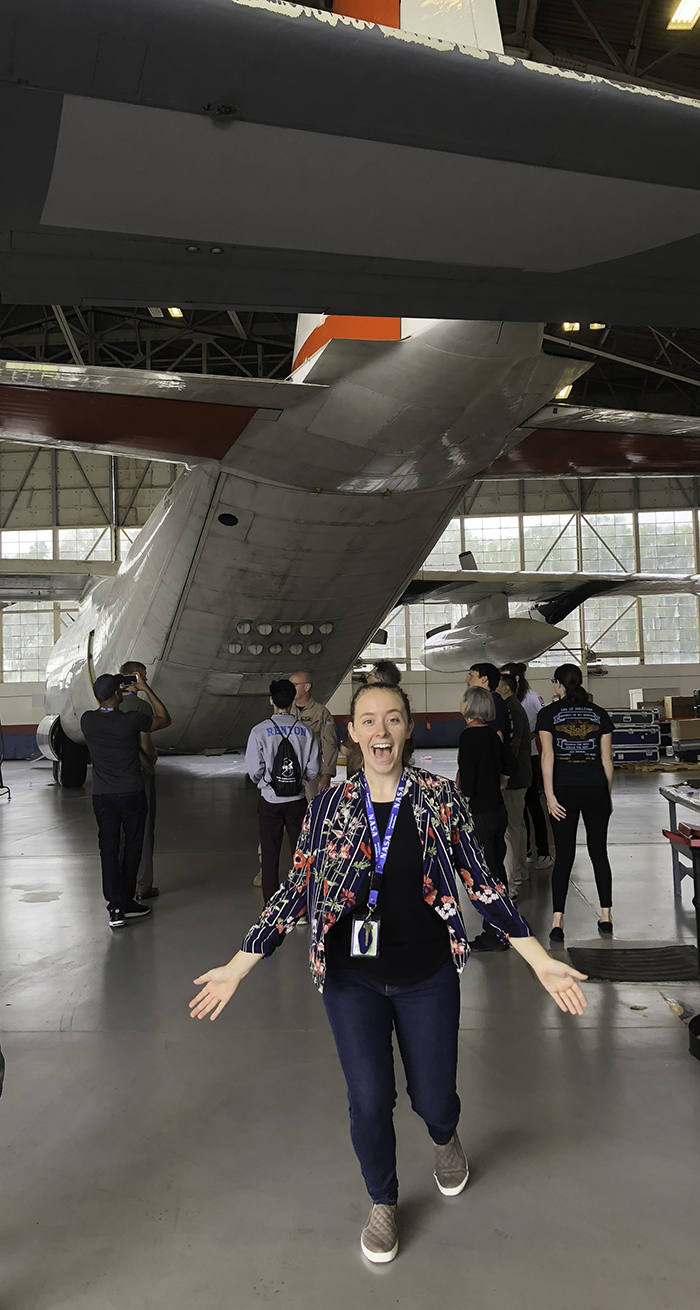
Carmen Paquette at NASA's NCAS program. (Image courtesy of Carmen Paquette.)
“It is my goal to bring new audiences into the fascinating worlds of tap dance and science alike. I will continue to support educational outreach programs that promote STEAM initiatives in education.”
Paquette’s appearance at Musical Magnetism isn’t her first incursion into educational outreach programs. For instance, she's taught in the Afterschool Matters program as a part of M.A.D.D. Rhythms (Making a Difference Dancing Rhythms) which is a performing troupe as well as a non-profit seeking to use dance as a resource for underserved youth in Chicago.
In another upcoming STEAM event, a video of the dance Paquette choreographed about her REU research will premier at the Science Arts Festival in April. It features both Paquette and her mentor, Daniel Shoemaker, who talk about some of the science in the piece that will be shown with the dance video.
Story by Elizabeth Innes, Communications Specialist, I-STEM Education Initiative. Photos by Elizabeth Innes, unless noted otherwise.
For more I-STEM web articles about I-MRSEC, see:
- On Her First Foray into STEAM, Kathy Walsh Acquaints Franklin Students with Microscopy, Haiku
- Musical Magnetism’s Destroy-A-Toy Activity: Messy, Definitely Curiosity-Driven and Educational!
- Via I-MRSEC’s Magnetic Fields Web Series, Youth Discover Magnetism, Diversity in Science
- I-MRSEC REU Teaches Carmen Paquette a Lot About Magnetism, Research, and Herself
- I-MRSEC REU Exposes Undergrads to Materials Science, Research, and What Grad School Is Like
- Franklin Steam Academy Students Experience High-Tech Science at MRL
- I-MRSEC, Champaign Educator Jamie Roundtree, Embrace Hip Hop/Rap to Reach Youth at Their Level
- Polímeros! Cena y Ciencias Program Teaches About Materials Through a Supper & Science Night
- I-MRSEC: Creating a Multidisciplinary Materials Research Community
More: 6-8 Outreach, Franklin STEAM Academy, I-MRSEC, STEAM/SciArt, Underserved, 2021
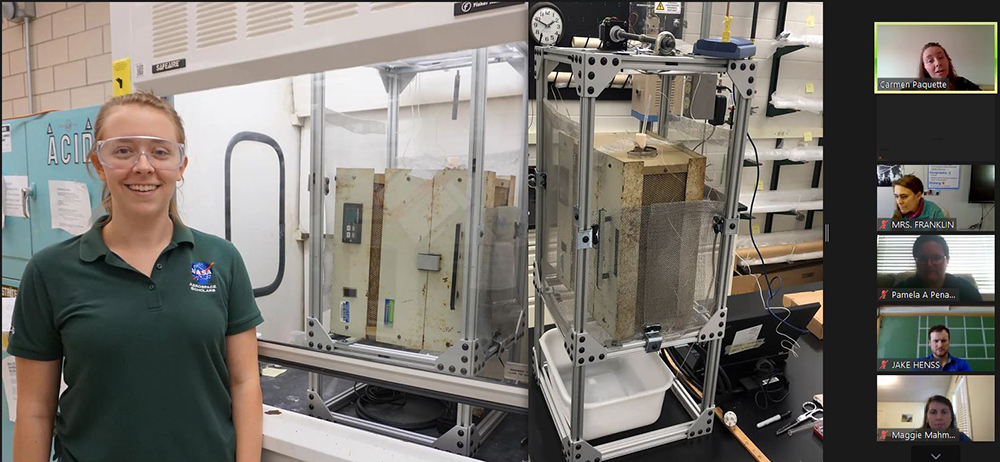 During Pacquette's Zoom presentation, she shows a photo of her at Illinois in Daniel Shoemaker’s lab during her REU experience in the summer of 2019. She's standing next to the vertical Bridgman furnace that she built. (Image courtesy of Carmen Paquette).
During Pacquette's Zoom presentation, she shows a photo of her at Illinois in Daniel Shoemaker’s lab during her REU experience in the summer of 2019. She's standing next to the vertical Bridgman furnace that she built. (Image courtesy of Carmen Paquette).












.jpg)















